Prevent curious neighbors or unwanted attention from invading your privacy and outdoor living space. Knowing which privacy trees to plant on your property line will help you protect your loved ones’ privacy.
homeandgardeningguide.com gathered the following species information, mature size, and soil information for some of the best privacy trees.
1. Arborvitae (Thuja)
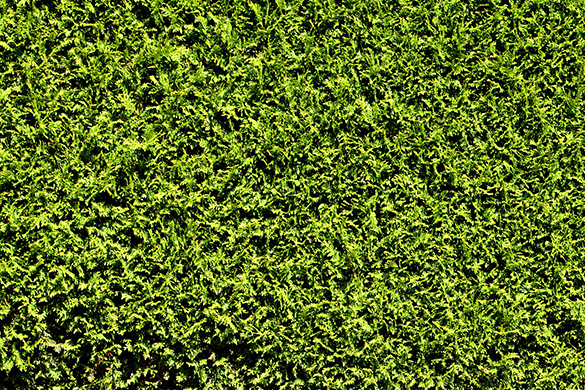
Arborvitaes have reddish-brown bark, and their soft, scale-like leaves are arranged into fan-shaped branchlets. This variety of evergreens is mildly aromatic and soft to the touch. This species is most often planted as a privacy screen or for hedges.
Mature Size – This species grows to a height of 40 to 60 feet and a 10 to 15-foot spread at maturity.
Spacing – Planting your arborvitae approximately ten feet apart is wise. If you plan to prune the plant to maintain a size or shape, make necessary adjustments when spacing your arborvitae.
Soil Requirements – Arborvitae adapt to a range of soil types, including red clay, but the species prefer moist, well-drained loam.
Water Needs – Approximately 10 gallons of water per inch of the tree’s diameter is recommended for established trees growing in well-drained soil.
Hardiness Zone – 3 through 8
2. Leyland Cypress (Cupressus leylandii)
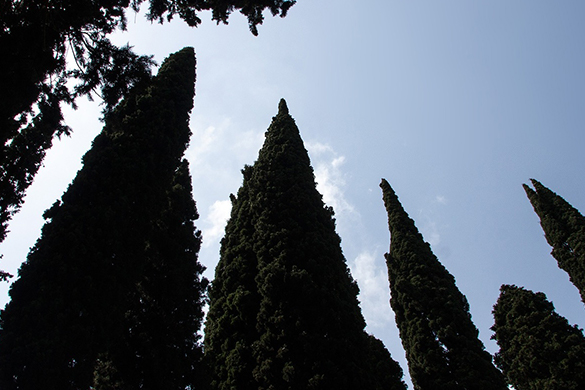
The Leyland Cypress is an evergreen, vigorous tree, densely foliaged to the base. This species has a pleasing mid-green or blue-green foliage made up of soft, scale-like needles.
Mature Size – This species grows to a height of 60 to 70 feet and a 15 to 25-foot spread at maturity.
Spacing – Cupressus leylandii should be spaced 6 to 10 feet apart for privacy.
Soil Requirements – This species grows well in acidic, alkaline, loamy, moist, sandy, well-drained, and clay soils.
Water Needs – A Leyland cypress requires a few months to get established and needs frequent deep waterings during this time. Once established, give the tree 1 gallon of water per week for each foot of height.
Hardiness Zone – 6 through 10
3. Juniper (Juniperus)
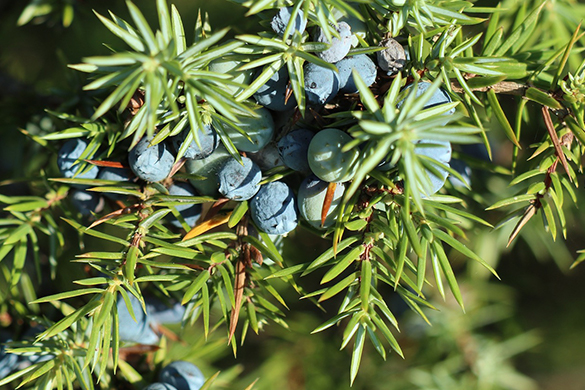
Junipers can vary in size and shape (depending on the variety) from tall trees to columnar or low-spreading shrubs with long, trailing branches. This species is evergreen with needle or scale-like foliage.
Mature Size – This species grows to a height of 1 to 50 feet and a 6 to 20-foot spread at maturity.
Spacing – For a privacy screen, space your juniper trees five feet apart or three feet apart for a solid wall.
Soil Requirements – Junipers are very tolerant of dry, clay soils, and many varieties will thrive in sand. All varieties require well-drained soil.
Water Needs – Once established, Juniper trees require little to no supplemental watering. In fact, they are more likely to contract soil-born diseases from overwatering.
Hardiness Zone – 2 through 7
4. Weeping Willow (Salix babylonica)
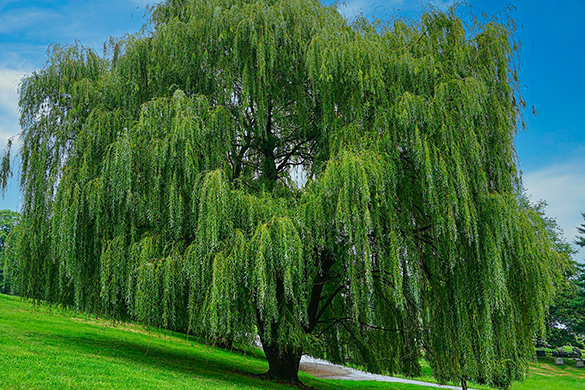
Weeping willow trees are popular for their dramatic, elegant, weeping appearance. Their long, graceful branches fall into an arch, creating a rounded canopy gently grazing the ground. Their flowing, narrow leaves are light green on top, with silver undersides until they turn yellow in fall.
Mature Size – This species grows to a height of 30 to 40 feet and a 30 to 35-foot spread at maturity.
Spacing – For a privacy screen, space your weeping willow trees 40 to 50 feet apart.
Soil Requirements – Weeping willows grow well in acidic, alkaline, loamy, moist, rich, sandy, well-drained, and clay soils.
Water Needs – You should water a weeping willow weekly for the first year after planting. Once established, you only need to water it enough to keep the soil from drying out.
Hardiness Zone – 6 through 8
5. Yew (Taxas baccata)
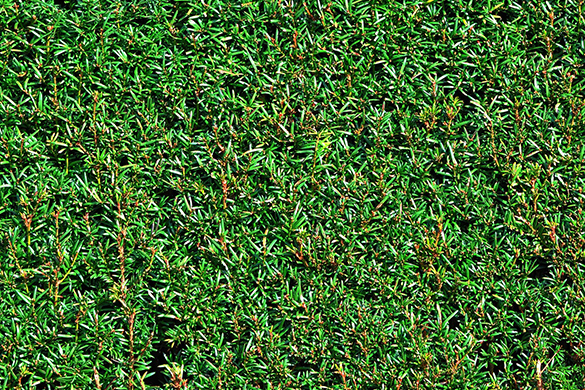
Yew trees are densely branching, evergreen trees with big trunks. The tree’s bark is thin, scaly, and brown, coming off in small flakes. Its leaves are dark green, leathery, and narrow with a pointed tip. Once called the “graveyard tree” in England, the yew has a reputation for sudden death in both people and livestock.
Mature Size – This species typically grows to a height of 20 to 30 feet and a 15 to 20-foot spread at maturity.
Spacing – Space your yew trees 5 to 10 feet apart for a privacy screen. This species grows considerably more densely when planted closer together.
Soil Requirements – This species thrives in rich, loamy soil with a neutral to slightly alkaline pH. It also does surprisingly well in heavy clay. However, planting sites that trap water can quickly result in root rot.
Water Needs – Yews require minimal watering. Only during drought conditions would weekly watering be recommended.
Hardiness Zone – 3 through 8
BONUS – Holly (Ilex)
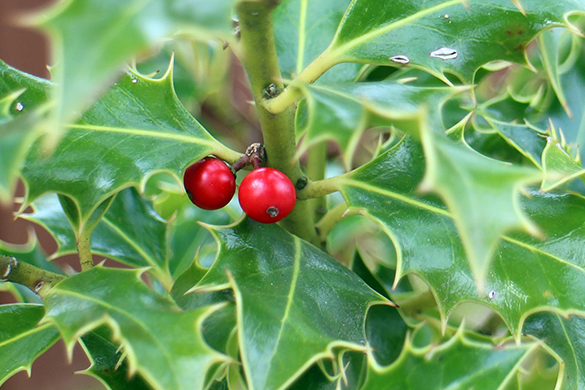
The American holly is an evergreen tree with stout, stiff branches and spine-tipped leaves. Female trees produce small, bright red berries. Holly is well known for its tough, spiny leaves; the long, needle-like spines successfully deter browsing wildlife.
Mature Size – This species typically grows to a height of 40 to 50 feet and a 20 to 40-foot spread at maturity.
Spacing – It is recommended to plant hollies 5 to 6 feet apart to create a dense hedge or privacy screen.
Soil Requirements – Hollies prefer loamy, well-draining soil kept evenly moist.
Water Needs – Once established, the bush should get 2 inches of water weekly.
Hardiness Zone – 3 through 11
Privacy Tree Species
In this article, you discovered species, mature size, and soil information for some of the top-rated, most popular, and fastest-growing privacy trees.
Planting privacy trees allows you to enjoy your outdoor activities without worrying if your neighbors are spying on your every move. These trees will also provide much-needed shade and protection from severe weather.
Without privacy trees your outdoor activities and family’s personal lives will be in the open for curious neighbors and potential criminals to watch.
Sources:
ipm.ucanr.edu/PMG/GARDEN/PLANTS/arborvitae.html
edis.ifas.ufl.edu/publication/ST671
hgic.clemson.edu/factsheet/juniper/
bellarmine.edu/faculty/drobinson/weepingwillow.asp
ipm.missouri.edu/MEG/2020/6/yews-DT/
gardeningsolutions.ifas.ufl.edu/plants/trees-and-shrubs/shrubs/holly.html
Visit http://www.homeandgardeningguide.com/gardening-landscaping/trees/ for more tree planting and care articles, resources, DIY, and how-to tips.
The post 5 Best Trees for Privacy appeared first on http://www.homeandgardeningguide.com
No comments:
Post a Comment